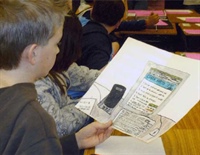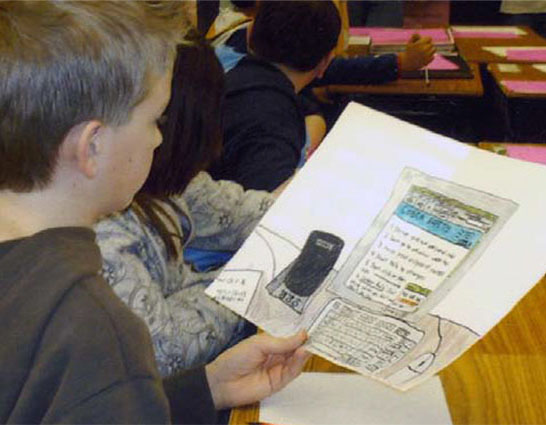Do you want to do more with your advisory period? Maybe you want to bring students and the community closer, or maybe you are looking to change a negative school climate into a positive one. You might want to try R Character Council, an advisory program developed at Ridgewood Middle School in Arnold, Missouri.
R Character Council is a 48-minute elective class that is taught by our team of three regular classroom teachers: Ann Asher (eighth grade English), Brandi Owens (art), and Ryan Wideman (seventh grade science). We organize 60 students into 15 different committees, run as cooperative groups, which do great things for the school and the community.
Making It Work

R Character Council students teach their peers about issues such as bullying.
One of the main responsibilities of R Character Council students is reinforcing the values and beliefs of our community by teaching lessons to their peers. Each week during advisory, students teach their peers lessons about respect, responsibility, cooperation, and honesty. These values were decided upon by the consensus of many different representatives of the community: students, teachers, parents, clergy, and business leaders. Therefore, students in our program know that what they are teaching each week is what is expected of them in our school and in our town. This connection makes the messages they convey to the student body even more meaningful.
For example, one of the lessons we helped the kids create was geared toward good character in the workplace. Our council students developed questions centered around behavior expectations in the working world. R Character Council’s team of teachers then invited local business owners and managers into our building to answer the students’ questions during advisory.
Through the question and answer session, the students realized how the behavior that is expected in school is the very same behavior that is expected in the working world. The lesson answered the eternal question, “Why do we have to know this?”
In addition to teaching character education lessons, R Character Council students work in committees throughout the week. For example, the Community Relations Committee recognizes community leaders who are showing excellent character in the things they do and in the choices they make. We guide students as they research honorees, write speeches, create award certificates, and then honor the recipients in schoolwide assemblies.
This program is one of many ways R Character Council helps students connect to their community. It also helped change the negative attitudes that the community had about Ridgewood.
Another program run through R Character Council Committees teaches Internet safety to parents, Ridgewood students, and sixth graders from the feeder elementary schools.
Several committees designed Internet safety brochures for parents that were handed out at conferences. Council students taught Ridgewood students an entire cyberbullying and cyber-safety unit, and then the Transition Committee prepared a video presentation and lecture on the same topic that was presented to sixth graders at our four feeder elementary schools.
R Character Council has helped to change the attitudes of many people in the school and community. With the new attitude adjustment came some welcome results: our test scores are now at or above the Missouri state average. Ridgewood went from worst attendance to best attendance for secondary schools in our district, and discipline referrals have dropped significantly. This climate change was definitely welcomed.
Sure, we could tell you that if you begin our program, everything will be wonderful and perfect and no one will complain…ever. We did, however, face some challenges with the program.
Challenge #1: Reluctant Staff
When we began our program, some staff members weren’t quite on board with the idea of students teaching. They didn’t know what role they, as advisors, would play during the teaching times. Was this just one more prep for them to teach? And what were they supposed to do while the kids were teaching? Grade papers? Through trial and error we are now able to clearly define the advisor’s role.
Making It Work

After a council-led lesson on cyber safety, students worked on posters for a contest.
As advisors, teachers are expected to be familiar with the lessons that the council students will be teaching. On Monday, the council sponsors e-mail the lesson for the week to the teachers so they are prepared to participate. On Wednesday, when the kids are teaching, the teachers handle classroom management and help the council students if they get stuck during discussions.
Challenge #2: Time to Teach
With each lesson that we model to our council kids, we incorporate teacher tips into the lesson. We make sure they plan how they will introduce the lesson and how they will divide their class into groups. All of the teaching instruction is done as part of their lesson preparation day. Things will not be perfect with the first lesson, but with a little experience the kids will soon amaze you.
Challenge #3: Special Needs Kids
Having a learning disability doesn’t preclude students from being part of council. In fact, we usually don’t know we have kids on IEPs until we get copies from our special education teachers.
For special needs students, teaching the lessons is generally their biggest obstacle. We found that by partnering our kids up, they can play off of each other’s strengths and compensate for each other’s weak areas. For example, one year we had a student who could barely read. Any time a lesson called for something to be read aloud, his partner took on that role.
Challenge #4: Letting Someone Go
Students must apply to be on R Character Council and go through an interview process. Sometimes the kids we select for council aren’t successful. We included a written policy for dismissal from council in our constitution. First, kids get a warning in the form of a conference with the sponsors. We identify the problem and remind the student of the high expectations associated with our organization.
For example, if we get a complaint from a classroom teacher that Johnny is being disruptive in his class, we will call Johnny in for a conference. If the problem continues, we will call his parents and he will be placed on probation. If we receive any additional complaints about his classroom behavior, Johnny will be removed from council.
Unfortunately, each year we usually have a couple of Johnnys, but replacement is never difficult. We always keep the applications of the kids whom we didn’t select.
Make a Difference
Don’t let the pitfalls discourage you from establishing a similar program at your school. The first year will be the most difficult because you don’t have your resources built up yet. Each lesson you try and event you plan is an experiment. With time and experience, the program will become easier.
Keep your own binder with ideas and lessons that worked well and those that did not. A hint: any activity with a hula hoop—great; any lesson that calls for the use of a raw egg—not so great. These resources will serve you well in the years to come.
R Character Council gives students the opportunity to make a positive difference in the school. You can use the program in its entirety or just bits and pieces to suit your situation. If you want your students to really connect to their school and create a wonderful climate for learning, try R Character Council. You won’t believe the change.
Previously published in Middle Ground magazine, February 2009
